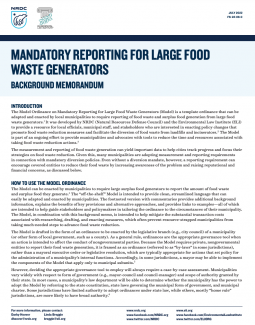
Up to 40 percent of food in the United States is wasted—and 95 percent is disposed of in landfills or incinerated. Diverting food waste from landfills by preventing food waste, donating surplus food, and recycling food scraps can help municipalities achieve waste reduction and climate mitigation goals. However, many municipalities do not have data on the food wasted in their jurisdictions. Requiring organizations and companies that produce large amounts of food waste to report their waste is an important first step in reducing that waste.
The Model Ordinance on Mandatory Reporting for Large Food Waste Generators, created by NRDC and the Environmental Law Institute, can be used by municipalities to require businesses, universities and other large organizations to report the amounts of food waste and surplus food they generate. The ordinance can be adapted as needed by municipalities and other types of local governments.
This background memo dives deeper into the context, methodology, and background information that informed the model ordinance, explaining the benefits of key provisions and providing information about alternative approaches that can help guide municipalities in tailoring the policy to their unique circumstances while still achieving the goals of the model ordinance. The memo accompanies the two versions of the model ordinance itself: one version with commentaries, which also touches upon benefits and alternative approaches, and an "off-the-shelf" version of the ordinance that serves as a template without commentaries.
The ordinance and other resources on food waste reduction are available through ELI’s Food Waste Initiative: https://www.eli.org/food-waste-initiative/food-waste-prevention-recovery-and-recycling.